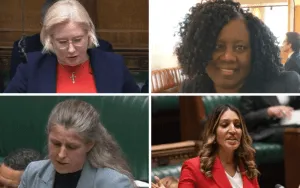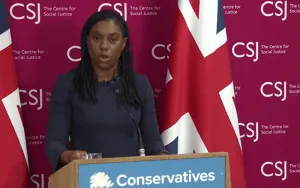Disabled activists have spoken of their growing frustration and even anger with Labour’s failure to engage properly with user-led organisations, after the party announced a new roadshow aimed at hearing from individual disabled people around the country.
Vicky Foxcroft, Labour’s shadow minister for disabled people, is to hold 11 online events with disabled people across England, Scotland and Wales, starting next Friday (19 February).
The virtual roadshow follows a similar exercise that began five years ago and fed into the party’s 2017 general election manifesto.
But there was anger and frustration with Labour among disabled campaigners who spoke to Disability News Service (DNS) this week, both on and off the record, about the plans.
They fear the new events will be merely a “tick-box exercise” aimed at trying to show that Labour is listening to disabled people, while allowing the party to sidestep proper engagement with representative organisations.
They also pointed to the UN Convention on the Rights of Persons with Disabilities, which makes it clear that governments (although not explicitly opposition parties) must “actively involve” disabled people in developing policies through engaging with disabled people’s organisations (DPOs)*.
In announcing the roadshow, Foxcroft (pictured, left) said that it “kickstarts a four-year engagement programme” leading up to the next general election and that she wants to speak to “as many disabled people, charities, disabled [people’s] organisations, unions and other civil society organisations as possible”.
Among those speaking out this week was Ellen Clifford, a member of the steering group of Disabled People Against Cuts (DPAC), who described Labour’s move as “unbelievably arrogant and offensive” after years of work put in by disabled people and DPOs to agree priorities and policy solutions.
Her DPAC colleague Paula Peters (pictured, right) said she was “really concerned that it’s a tick-box exercise which will achieve nothing” and will mean the party will be “glossing over real concerns disabled people have and ignoring them”.
Peters pointed to Labour’s continuing failure to speak out on crucial issues affecting disabled people, including the “catastrophic impact of austerity” that has led to the deaths of disabled benefit claimants such as Philippa Day and Jodey Whiting.
Mark Harrison (pictured, centre), from the Reclaiming Our Futures Alliance (ROFA), of which DPAC is a member, said he had “serious misgivings” about the roadshow.
He said ROFA, DPAC and others had made clear to Foxcroft, shadow women and equalities secretary Marsha de Cordova and Labour leader Keir Starmer at a meeting in December that “we didn’t need any more roadshows”.
He said: “Disabled people told the Labour party exactly what the issues were when the roadshows happened in 2016 and informed the development of the manifesto in 2017.
“They might need a little updating but what we need is proper co-production with the disability movement and DPOs around good policy-making for, with and by disabled people.”
He added: “They can pick any Tom, Dick and Harry off the street and they will get 1,001 views.
“If they want hundreds and thousands to sprinkle and decorate their cake then that is the way to go.
“If they are serious about implementing disabled people’s human rights in line with the social model and the UN convention they will engage with representative organisations of disabled people.
“The fact that they are going a different way is incredibly frustrating.”
Kathy Bole, co-chair of Disability Labour, agreed with the need for Labour to engage with DPOs.
She said: “While I would always be glad Labour is speaking to disabled people, the term roadshow evokes a bad feeling.
“We don’t need a roadshow, we need a constant dialogue. We need tangible change and it is overdue. We are growing weary of being overlooked time and time again.”
A Labour spokesperson told DNS: “Vicky and Labour are committed to ensuring that disabled people are not left behind as we emerge from the pandemic, and this includes talking to as many disabled people and organisations as possible.
“DPOs have a crucial role to play and we will continue to engage and consult them.
“Our priority is to continue working together to develop our policies to ensure that, when Labour is in government, we will deliver justice and fairness for disabled people after years of the Conservatives having the wrong priorities.”
Although he said that the results of the last roadshow “were written up into the last manifesto, which will be used as part of our policy development”, he had not clarified by noon today (Thursday) whether the notes and results collected from that roadshow would be used.
*The UNCRPD makes it clear that, when developing laws and policies relating to disabled people, governments “must closely consult with and actively involve persons with disabilities, including children with disabilities, through their representative organizations”.
It defines “representative organizations” as those that are “led, directed and governed by persons with disabilities”, a definition which the UN committee on the rights of persons with disabilities included in its general comment number seven, which was adopted in September 2018.
A note from the editor:
Please consider making a voluntary financial contribution to support the work of DNS and allow it to continue producing independent, carefully-researched news stories that focus on the lives and rights of disabled people and their user-led organisations.
Please do not contribute if you cannot afford to do so, and please note that DNS is not a charity. It is run and owned by disabled journalist John Pring and has been from its launch in April 2009.
Thank you for anything you can do to support the work of DNS…

 New analysis shows disabled people’s strongest allies among MPs
New analysis shows disabled people’s strongest allies among MPs Badenoch silence after ‘ticking time bomb’ claim is exposed as a lie by official figures
Badenoch silence after ‘ticking time bomb’ claim is exposed as a lie by official figures Urgent letter from UN to Labour government warns: We think your cuts continue Tory attack on disability rights
Urgent letter from UN to Labour government warns: We think your cuts continue Tory attack on disability rights